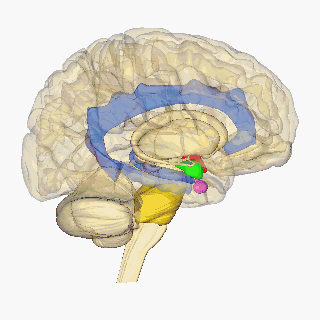Related Research Articles

A maternal bond is the relationship between a mother and her child. While typically associated with pregnancy and childbirth, a maternal bond may also develop in cases where the child is unrelated, such as an adoption.
The Gottfried Wilhelm Leibniz Prize, in short Leibniz Prize, is awarded by the German Research Foundation to "exceptional scientists and academics for their outstanding achievements in the field of research". Since 1986, up to ten prizes are awarded annually to individuals or research groups working at a research institution in Germany or at a German research institution abroad. It is considered the most important research award in Germany.

Achim Peters is a German internist and brain researcher. He developed the Selfish Brain Theory.

Cordelia Fine is a Canadian-born British philosopher of science, psychologist and writer. She is a full professor of history and philosophy of science at the University of Melbourne, Australia. Fine has written three popular science books on the topics of social cognition, neuroscience, and the popular myths of sex differences. Her latest book, Testosterone Rex, won the Royal Society Science Book Prize, 2017. She has authored several academic book chapters and numerous academic publications. Fine is also noted for coining the term 'neurosexism'.
Sigrid Weigel is a German scholar of literary studies, critical theory, a specialist of cross-disciplinary research, and a leading scholar of Walter Benjamin, Aby Warburg, and the cultural science (Kulturwissenschaft) around 1900. She held professorships at Hamburg, Zürich, and Berlin and established the internationally noted Advanced Studies “Center for Literary and Cultural Research” in Berlin. In 2016, she received the renowned Aby Warburg Prize of the City of Hamburg.

Tania Singer is a German psychologist and social neuroscientist and the scientific director of the Max Planck Society's Social Neuroscience Lab in Berlin, Germany. Between 2007 and 2010, she became the inaugural chair of social neuroscience and neuroeconomics at the University of Zurich and was the co-director of the Laboratory for Social and Neural Systems Research in Zurich. Her research focuses on the developmental, neuronal, and hormonal mechanisms underlying human social behavior and social emotions such as compassion and empathy. She is founder and principal investigator of the ReSource project, one of the largest longitudinal studies on the effects of mental training on brain plasticity as well as mental and physical health, co-funded by the European Research Council. She also collaborates with the macro-economist Dennis Snower on research on caring economics. Singer's Caring Economics: Conversations on Altruism and Compassion, Between Scientists, Economists, and the Dalai Lama was published in 2015. She is the daughter of the neuroscientist Wolf Singer.
Arno Villringer is a Director at the Department of Neurology at the Max Planck Institute for Human Cognitive and Brain Sciences in Leipzig, Germany; Director of the Department of Cognitive Neurology at University of Leipzig Medical Center; and Academic Director of the Berlin School of Mind and Brain and the Mind&Brain Institute, Berlin. He holds a full professorship at University of Leipzig and an honorary professorship at Charité, Humboldt-Universität zu Berlin. From July 2022 to June 2025 he is the Chairperson of the Human Sciences Section of the Max Planck Society.

The neuroscience of sex differences is the study of characteristics that separate the male and female brain. Psychological sex differences are thought by some to reflect the interaction of genes, hormones, and social learning on brain development throughout the lifespan.
Claus Lamm is a Professor of Biological Psychology and the head of the Social, Cognitive and Affective Neuroscience Unit at the Faculty of Psychology of the University of Vienna. His research focuses on the psychological and biological mechanisms underlying social cognition, affect, and behavior. His main research interest are the neural underpinnings of empathy, to whose understanding he has made pioneering contributions.
Ulrike Beisiegel is a German biochemist and university professor who in 2011 became the first woman to serve as president of the University of Göttingen, founded in 1737. Her research on liver fats and disease was honored with the Heinz Maier-Leibnitz Prize, the Rudolf Schönheimer Medal and an honorary doctorate. Intent on maintaining high levels of scholarship and diminishing scientific misconduct, she has served on many boards and committees, receiving the Ubbo-Emmius Medal for her commitment to good scientific practice and an honorary doctorate from the University of Edinburgh.
Edward S. Ruthazer is a Canadian neuroscientist and professor at McGill University in Montreal, Quebec.

Gina Rippon is a British neurobiologist and feminist. She is a professor emeritus of cognitive neuroimaging at the Aston Brain Centre, Aston University, Birmingham. Rippon has also sat on the editorial board of the International Journal of Psychophysiology. In 2019, Rippon published her book, Gendered Brain: The New Neuroscience that Shatters the Myth of the Female Brain, which investigates the role of life experiences and biology in brain development.
Anelis Kaiser is professor of gender studies at MINT, University of Freiburg, Germany. She is also on the lecturer within the social psychology and social neuroscience department at the University of Bern, Switzerland. Along with Isabelle Dussauge, Kaiser was a guest editor of a special issue on Neuroscience and sex/gender of the journal Neuroethics, they also co-founded The NeuroGenderings Network together.
The NeuroGenderings Network is an international group of researchers in neuroscience and gender studies. Members of the network study how the complexities of social norms, varied life experiences, details of laboratory conditions and biology interact to affect the results of neuroscientific research. Working under the label of "neurofeminism", they aim to critically analyze how the field of neuroscience operates, and to build an understanding of brain and gender that goes beyond gender essentialism while still treating the brain as fundamentally material. Its founding was part of a period of increased interest and activity in interdisciplinary research connecting neuroscience and the social sciences.
Giordana Grossi is a cognitive neuroscientist and professor of psychology at SUNY New Paltz, New York, and a member of The NeuroGenderings Network, a group which promotes "neurofeminism".
Daphna Joel is an Israeli neuroscientist and advocate for neurofeminism. She is best known for her research which claims that there is no such thing as a "male brain" or a "female brain". Joel's research has been criticized by other neuroscientists who argue that male and female brains, on average, show distinct differences and can be classified with a high level of accuracy. Joel is a member of The NeuroGenderings Network, an international group of researchers in gender studies and neuroscience. They are critical of what they call 'neurosexism' in the scientific community. Joel has given lectures on her work in both scientific and lay conventions around the world.
Deboleena Roy is professor and chair of Women's, Gender, and Sexuality Studies and Neuroscience and Behavioral Biology at Emory University, former resident research fellow at the Clayman Institute for Gender Research, Stanford University, and a member of The NeuroGenderings Network. Previously, she was an assistant professor at San Diego State University. Starting in August 2020, she will be serving as the Senior Associate Dean of Faculty for Emory College of Arts and Sciences.
Isabelle Dussauge is a science, technology and society (STS) researcher at the Department of History of Science and Ideas, Uppsala University, Sweden and former assistant professor at the Department of Thematic Studies, Linköping University, Sweden. She is also the co-founder, with Anelis Kaiser, of The NeuroGenderings Network, and acted as guest editor, again with Kaiser on the journal Neuroethics.

Catherine Vidal is a French neurobiologist, feminist and essayist. She is the author of popular science books in the field of cognitive differences between genders.
Sabine Strasser is an Austrian social anthropologist who specializes in migration and gender issues. She evaluates the political nature of transnational relationships, particularly with regard to diversity and multiculturalism. She was one of the first researchers hired when the University of Vienna's founded its Inter-University Coordination Center of Women's Studies in 1993. She has taught at the University of Vienna and the Middle East Technical University in Ankara, Turkey. Since 2013, she has served as a professor at the University of Bern.
References
- 1 2 3 "Dr. Sigrid Schmitz". univie.ac.at. University of Vienna [Universität Wien]. Retrieved 1 September 2017.
- ↑ "Dr. Sigrid Schmitz". geschichte.hu-berlin.de. Humboldt University of Berlin . Retrieved 1 September 2017.
- ↑ Schmitz, Sigrid, ed. (2012–13). "Aktuelles team" [Current team](PDF). Kehrseiten. Gender Research Office [Referat Genderforschung], University of Vienna. 4: 2. ISSN 2076-9571.
- ↑ "Members". neurogenderings.wordpress.com. The NeuroGenderings Network. 2014-10-21. Retrieved 1 September 2017.
- ↑ Schmitz, Sigrid (1992). Influence of domestication on genetically fixed learning dispositions: a comparative analysis of wild Mallard and domesticated Peking ducks[Einfluß der Domestikation auf genetisch fixierte Lerndispositionen. Ein Vergleich der Wildform, der Stockente und ihrer domestizierten Form, der Pekingente] (Ph.D thesis). Department of Biology, University of Marburg.
- ↑ Schmitz, Sigrid; Nikoleyczik, Katrin (2009). "Transdisciplinary and gender-sensitive teaching: didactical concepts and technical support". International Journal of Innovation in Education. Inderscience. 1 (1): 81. doi:10.1504/IJIIE.2009.030105.
- ↑ Schmitz, Sigrid; Höppner, Grit (25 July 2014). "Neurofeminism and feminist neurosciences: a critical review of contemporary brain research". Frontiers in Human Neuroscience. Frontiers. 8 (546): 546. doi: 10.3389/fnhum.2014.00546 . PMC 4111126 . PMID 25120450.
- ↑ Schmitz, Sigrid (2014), "Feminist approaches to neurocultures", in Wolfe, Charles (ed.), Brain theory: essays in critical neurophilosophy, Basingstoke, Hampshire: Palgrave Macmillan, pp. 195–216, ISBN 9780230369573.